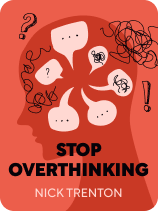

This article is an excerpt from the Shortform book guide to "Stop Overthinking" by Nick Trenton. Shortform has the world's best summaries and analyses of books you should be reading.
Like this article? Sign up for a free trial here.
What are the most memorable Stop Overthinking quotes? Have you ever spent a long time worrying about a problem only to end up feeling stressed and no closer to a solution?
In Stop Overthinking, Nick Trenton explains that you were probably overthinking the problem: reflecting on it so much that it made you feel bad. He argues that by adopting stress management skills, you can stay grounded in the present moment and not be controlled by endless worrying.
Below we’ll look at the four best Stop Overthinking quotes that highlight the main ideas.
Stop Overthinking Quotes on Living a Stress-Free Life
Overthinking is a hard habit to conquer, but Trenton is positive that anyone can overcome it. In just these four Stop Overthinking quotes, you’ll learn the basics of Trenton’s book, including what overthinking is, what causes it, and how to stop it.
“Stress is a fact of life, but overthinking is optional!”
According to Trenton, overthinking is what happens when you think about something so much that it becomes harmful to your health. For example, you just decided between two apartments and signed a lease. Right after, you start wondering whether you made the right choice and spend so much time thinking about it that you feel stressed and anxious all week.
You might think that your thoughts are helpful—that you’re working to solve the issue—but Trenton says that’s rarely the case. When you think about the same thing over and over again, your thoughts cease to add value or provide any solutions to the problem—they only create stress. In fact, whatever problem you’re grappling with usually isn’t the true cause of the anxiety you’re feeling. Rather, it’s your overthinking habit that creates anxiety.
For example, in a job interview, you might have responded to a question in a way you didn’t intend to and then spent hours worrying about that moment. In this case, your worry doesn’t change how you responded to the question. What’s more, your response to the interview question may not have even been problematic: It’s just your swirling thoughts and worries about the response that create a problem and give you anxiety.
“Let’s begin with a common explanation for anxiety: genetics.”
Why do some people overthink more than others? Trenton explains that anxiety and overthinking are intertwined. When you’re prone to anxiety, you’re more likely to overthink. Two main factors affect your level of anxiety: your genetics and your environment.
Although there isn’t one specific gene that causes anxiety, researchers have found that multiple genes can predispose you to it. People with these genes tend to have more overactive brains—when they’re not doing anything that requires mental focus, their thoughts are more prone to anxious wandering.
Environmentally, triggers in both your immediate surroundings and the broader world can increase your anxiety and overthinking tendencies. These might be things like smells or crowds. On a deeper level, researchers have also linked anxiety to past traumatic events, such as experiencing neglect during childhood.
“Remember that forgiveness is something you do for yourself, not the other person. When you forgive, you are releasing yourself from the stress and energy of resenting and blaming the other person.”
Instead of letting your anxious thoughts take over, try practicing four stress approaches to regain a sense of control:
Avoid the situation. Cut out unnecessary people or situations that cause you stress. For instance, if driving on the highway in heavy traffic makes you feel uncomfortable, try taking a local route or using public transportation.
Change the situation. When you can’t avoid a stressful situation, consider what you can change to reduce the stress. For example, if you’re struggling to concentrate on your work because of a construction project outside your building, purchase noise-canceling headphones. Also, people around you often aren’t aware of what’s bothering you about a situation. To change it, you often must speak out and express your needs and limitations. For example, if a friend needs to rant but you have a project due at the end of the day, respectfully communicate that you can’t hear them out right now.
Make peace with the situation. Sometimes, there’s nothing you can do to make a stressful situation better. Instead of worrying endlessly, acknowledge your feelings and make peace with the situation. For example, if your relative is in the hospital and you’re worried about their condition, acknowledge and accept that you feel concerned and understand there’s nothing you can do to alter the situation right now.
Adapt to the situation. Ease the stress of a challenging situation by changing your expectations. For example, if you’re frustrated because a project didn’t turn out the way you envisioned, reduce your stress by practicing forgiveness toward yourself and identifying what you learned from the experience.
“If we hope to successfully tackle overthinking, we need to take a step back rather than trying to work through the problem from inside our own rumination.”
To manage stress, Trenton suggests you work through it by writing in a journal. When you ignore your anxious thoughts and feelings, you’ll struggle to understand what causes them. However, by writing them down in a journal, you can productively process your emotions, understand what triggers them, and glean insights on how you can better cope with stress in the future.
Trenton recommends a research-backed approach to journaling about your stress: Start by recounting the stressful situation and describing the thoughts and feelings you had in that moment. Consider using a rating scale for your stress levels and try to notice any patterns of what’s most frequently causing you stress. Then, shift your focus to extracting something positive from the situation.
For example, if you argued with your partner about who will drive the kids to school after a miscommunication, you might record feeling frustrated that your partner didn’t express their time conflict beforehand and rate your stress as 7/10. Then, try to transition your focus to something good, such as being grateful that neither of you raised your voice in front of the kids.

———End of Preview———
Like what you just read? Read the rest of the world's best book summary and analysis of Nick Trenton's "Stop Overthinking" at Shortform.
Here's what you'll find in our full Stop Overthinking summary:
- What overthinking is and how it’s connected to stress and anxiety
- Ways you can manage stress before, during, and after it happens
- How to conquer your habit of overthinking with long-term solutions






